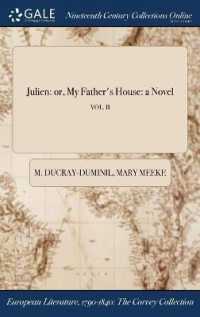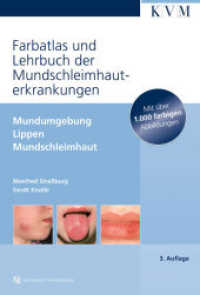- ホーム
- > 洋書
- > 英文書
- > Literary Criticism
Full Description
Beginning in 1172, Judah ibn Tibbon, who was called the father of Hebrew translators, wrote a letter to his son that was full of personal and professional guidance. The detailed letter, described as an ethical will, was revised through the years and offered a vivid picture of intellectual life among Andalusi elites exiled in the south of France after 1148. S. J. Pearce sets this letter into broader context and reads it as a document of literary practice and intellectual values. She reveals how ibn Tibbon, as a translator of philosophical and religious texts, explains how his son should make his way in the family business and how to operate, textually, within Arabic literary models even when writing for a non-Arabic audience. While the letter is also full of personal criticism and admonitions, Pearce shows ibn Tibbon making a powerful argument in favor of the continuation of Arabic as a prestige language for Andalusi Jewish readers and writers, even in exile outside of the Islamic world.
Contents
Acknowledgements
A Note on Translations and Transliterations
Introduction: 'The Preface of Every Book Is Its First Part': A Brief Overview of Materials and Methodology
1. 'Pen, I Recount Your Favor': Reading, Writing and Translating in Memory of al-Andalus
2. 'Examine your Hebrew Books Monthly and Arabic Books Bimonthly': Autobiography and Bibliography in the Islamic West
3. 'On Every Sabbath, Read from the Bible in Arabic': Reading the Hebrew Bible as Arabic Literature
4. 'The Words of the Ancient Poets': Poetics Between Jewish and Islamic Scripture
5. 'The Arab Sage Said': Transmitting Arabic Wisdom in Translation
6. 'From Vessel to Vessel': The Reception and Reimagining of the Tibbonid Corpus
Conclusion: "This Book Has Been Completed:" Looking Back and Ahead at al-Andalus in Translation
Appendix: Judah ibn Tibbon's Ethical Will: A New Translation
Bibliography
Index







